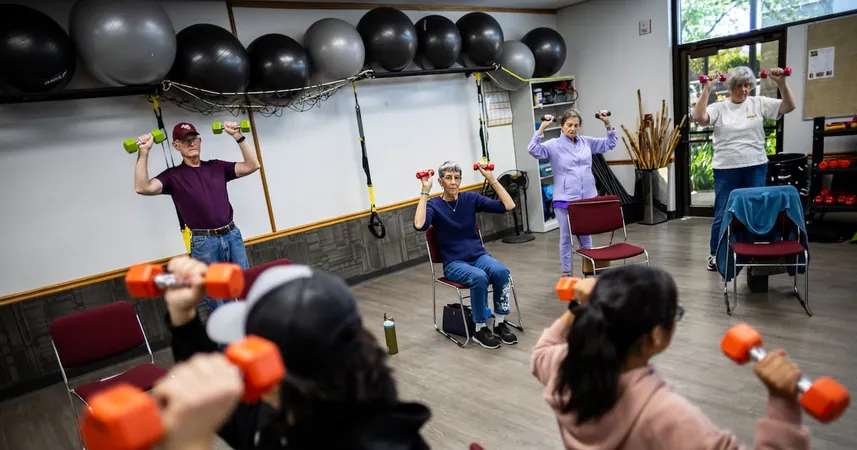
Unlocking the Secret to Staying Active: Motivating Seniors to Exercise
2025-05-26
Author: Sarah
Gathering at the Murray Senior Recreation Center
In a vibrant scene at the Murray Senior Recreation Center, a spirited group of 16 older adults gathered to engage in a lively exercise class. With chairs and dumbbells in hand, they followed enthusiastic instructors through a series of energetic workouts.
Inspiration in Action
Among the participants was 94-year-old Verna Harshberger, who, despite being unable to stand for certain exercises, adeptly modified them to fit her abilities. Her determination inspired fellow attendee Cathy Jeffs, who remarked, "If she can do it, so can I!" This camaraderie fuels their motivation as they navigate through exercises affectionately nicknamed "newspapers" and the challenging "sobriety test," which prompted laughter and friendly banter among the group.
The Power of Regular Exercise
As we age, maintaining an active lifestyle is crucial for preserving independence and continuing everyday activities. Traci Thompson, an assistant professor at the University of Utah, emphasizes that strength training enhances functional movements like getting in and out of chairs or climbing stairs, allowing seniors to engage fully in life.
Motivation Strategies for Seniors
Finding the motivation to stay active can be challenging, but Rebecca Davenport, an exercise science program manager, offers insights on how to ignite that spark. Enjoyment is key; whether it's hiking or swimming, discovering personal preferences can make all the difference. Thompson adds that practical goals, like being able to keep up with family during outings, can provide the necessary motivation to stick to an exercise routine.
Building a Supportive Community
Social support is vital in maintaining exercise habits. Signing up for classes not only builds commitment but also fosters friendships, as evidenced by Jeffs, who appreciates the camaraderie in her class. Longtime attendee Mely Colotla echoes this sentiment, stating that the fun atmosphere keeps her coming back.
Cardiovascular and Strength Training Recommendations
To promote heart health, the American College of Sports Medicine (ACSM) recommends 150 minutes of moderate exercise each week. For seniors, engaging activities like walking or gardening can suffice. Meanwhile, strength training twice a week, focusing on all major muscle groups, can combat the natural decline in lean muscle mass that typically begins around age 40.
Conclusion: The Path to a Healthier Future
Engaging in regular exercise is a cornerstone of living a vibrant, independent life in later years. By unearthing personal interests, setting meaningful goals, and surrounding themselves with supportive peers, older adults can not only stay motivated but also thrive in their physical health. It's never too late to embrace an active lifestyle!



 Brasil (PT)
Brasil (PT)
 Canada (EN)
Canada (EN)
 Chile (ES)
Chile (ES)
 Česko (CS)
Česko (CS)
 대한민국 (KO)
대한민국 (KO)
 España (ES)
España (ES)
 France (FR)
France (FR)
 Hong Kong (EN)
Hong Kong (EN)
 Italia (IT)
Italia (IT)
 日本 (JA)
日本 (JA)
 Magyarország (HU)
Magyarország (HU)
 Norge (NO)
Norge (NO)
 Polska (PL)
Polska (PL)
 Schweiz (DE)
Schweiz (DE)
 Singapore (EN)
Singapore (EN)
 Sverige (SV)
Sverige (SV)
 Suomi (FI)
Suomi (FI)
 Türkiye (TR)
Türkiye (TR)
 الإمارات العربية المتحدة (AR)
الإمارات العربية المتحدة (AR)